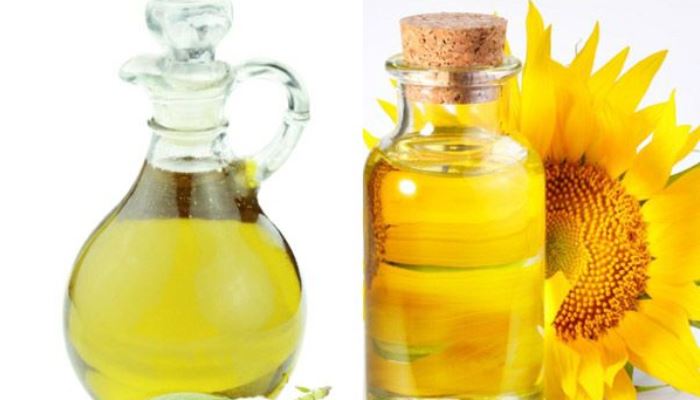
Sunflower oil is the non-volatile oil expressed from sunflower (Helianthus annuus) seeds. Sunflower oil is commonly used in food as afrying oil, and in cosmetic formulations as an emollient.
Composition
Sunflower oil contains predominantly linoleic acid in triglyceride form. The British Pharmacopoeia lists the following profile:
Palmitic acid : 4 - 9%,
Stearic acid : 1 - 7%,
Oleic acid : 14 - 10%,
Linoleic acid : 48 - 74%.
There are several types of sunflower oils produced, such as high linoleic, high oleic and mid oleic. Mid linoleic sunflower oil typically has at least 69% linoleic acid. High oleic sunflower oil has at least 82% oleic acid. Variation in unsaturated fatty acids profile is strongly influenced by both genetics and climate. In the last decade, high stearic sunflower lines have been developed in Spain to avoid the use of partially hydrogenated vegetable oils in food industry.
High-Oleic Oil
High-oleic sunflower oil is a non-hydrogenated version of the oil. According to the National Sunflower Association, this variety of sunflower oil is high in oleic or monounsaturated acids. The association states that a study has found a diet that contains a large amount of oleic acids can lower LDL (bad) cholesterol levels and contribute to a heart-healthy lifestyle. High-oleic sunflower oil is generally used in baking, in non-dairy coffee creamers and for frying.
Linoleic Oil
Linoleic oil is a partially hydrogenated version of sunflower oil. According to the USDA, it used to be the most popular variety of sunflower oil. Because linoleic oil must be partially hydrogenated to retain stability during use, it contains trans fats. Despite this, the majority of the fat that linoleic sunflower oil contains is polyunsaturated fat in the form of linoleic acid. Linoleic acid is an omega-6 fatty acid, which is one of the two fatty acids that people must incorporate into their diet. Because this is the predominant fat in linoleic sunflower oil, it is healthier than other types of hydrogenated and partially hydrogenated oils. Linoleic sunflower oil is generally used as liquid salad oil and to make margarine and shortening.
Mid-Oleic Oil
Mid-oleic oil, commonly known by trademarked name NuSun, is the most popular type of sunflower oil in the United States. Mid-oleic sunflower oil is not hydrogenated, and it is lower in saturated fat than linoleic sunflower oil. It also has more oleic acid than linoleic oil, as well as some linoleic acid. According to the National Sunflower Association, a study has shown that the unique balance of fats in mid-oleic sunflower oil lowers total and LDL cholesterol.  Fatty Acid Profiles
Fatty Acid Profiles
The main difference in health-benefit offerings in the various types of sunflower oils lies in their fatty acid profiles. The high-oleic oil is 82 percent monounsaturated fat, 9 percent polyunsaturated fat and 9 percent saturated fat. Linoleic oil is 20 percent monounsaturated fat, 69 percent polyunsaturated fat and 11 percent saturated fat. Mid-oleic oil is 65 percent monounsaturated fat, 26 percent polyunsaturated fat and 9 percent saturated fat. Of the three types of fat, saturated fat is the least heart-healthy option and therefore the best one one to avoid. However, all three of the oils are comparatively low in saturated fat, and the high level of linoleic acid present in the linoleic oil makes that oil a good choice, despite its saturated fat content.
Vitamin A
Besides being a good source of healthy fat, the National Sunflower Association states that all three varieties of the oil contain more vitamin E than any other type of vegetable oil.
Vitamin E
in the sunflower oil, also acts as moisturizer, by helping the body cells retain water inside them. For this property, sunflower is often used in cosmetic products. Sunflower oil, through vitamin E, also prevents rheumatoid arthritis, asthma and colon cancer. Sunflower oil also contains Vitamin B.
Phytonutrients
This benefits of sunflower oil is further enhanced by the phytochemicals, such as choline, phenolic acid, etc., present in it. These chemicals are known to prevent heart diseases. Rest assured that you will be drawing benefits of sunflower oil. The main sunflower oil benefits revolves around the presence of polyunsaturated and monounsaturated fats, along with vitamins in high quantity.
Sunflower oil also contains lecithin, tocopherols, carotenoids and waxes. Sunflower oil's properties are typical of a vegetable triglyceride oil. Sunflower oil is produced from oil type sunflower seeds. Sunflower oil is light in taste and appearance and has a high vitamin E content. It is a combination of monounsaturated and polyunsaturated fats with low saturated fat levels.
Health Benefit of Sunflower Oil
You can choose from the two types of sunflower oils, viz. linoleic and high oleic, that are available in the market. High oleic sunflower oil is known to be rich in the monounsaturated acids. But, it is the linoleic type that contains polyunsaturated fat, that we commonly know and use as sunflower oil.
- Sunflower oil contains more vitamin E than any other vegetable oil. They are also a prime source of essential fatty acids such as linoleic acid which is very vital for the healthy functioning of the body. Consuming sunflower oil on a regular basis can help to lower cholesterol levels. In fact, studies show that the consumption of sunflower oil can significantly lower the incidence of cardiovascular ailments.
- Sunflower oil works as a protective barrier against infection when applied to the skin.
- Sunflower oil contains folic acid which helps the body in the manufacture of new cells.
- Sunflower oil contains magnesium which helps in preventing muscle cramps.
- Sunflower oil is rich in certain phytochemicals such as choline and phenolic acid, which are beneficial heart. There are polyunsaturated and monounsaturated fats present in sunflower oil, along with vitamins, which makes it one of the healthiest oil to consume.
- Sunflower oil also helps in keeping the food fresh and healthy for a longer period of time. The oil can be used in extreme high cooking temperatures. Sunflower oil is being used by the food manufacturers for reducing the level of trans-fat in bulk production of food.
Diet and cardiovascular benefits
Sunflower oil is high in the essential vitamin E and low in saturated fat. The two most common types of sunflower oil are linoleic and high oleic. Linoleic sunflower oil is a common cooking oil that has high levels of the essential fatty acids called polyunsaturated fat. It is also known for having a clean taste and low levels of trans fat. High oleic sunflower oils are classified as having monounsaturated levels of 80% and above. Newer versions of sunflower oil have been developed as a hybrid containing linoleic acid. They have monounsaturated levels lower than other oleic sunflower oils. The hybrid oil also has lower saturated fat levels than linoleic sunflower oil.
oleic. Linoleic sunflower oil is a common cooking oil that has high levels of the essential fatty acids called polyunsaturated fat. It is also known for having a clean taste and low levels of trans fat. High oleic sunflower oils are classified as having monounsaturated levels of 80% and above. Newer versions of sunflower oil have been developed as a hybrid containing linoleic acid. They have monounsaturated levels lower than other oleic sunflower oils. The hybrid oil also has lower saturated fat levels than linoleic sunflower oil.
Skin protectant
Sunflower oil, like other oils, can retain moisture in the skin. It may also provide a protective barrier that resists infection in premature infants. Studies using sunflower oil have been conducted involving low birth weight infants that are often susceptible to infection due to their underdeveloped skin. The study determined that infants receiving a daily skin treatment of sunflower oil were 41% less likely to develop infections in hospital.
Moreover, folate or folic acid, present in sunflower oil, helps the body in the manufacture of new cells. Magnesium helps in preventing muscle cramps, while tryptophan helps in relaxing the brain and promoting sleep by helping the body in the production of the neurotransmitter, serotonin.
Negative health effects
Due to its high content of omega-6 polyunsaturated fatty acids, high consumption of sunflower oil is likely to cause breast and prostate cancer in post-menopausal women.
Cooking Tips
Sunflower oil is very light in flavor and therefore, does not overpower the other ingredients used in a recipe. This light flavor of sunflower oil makes it a perfect oil to make pasta dishes, including shrimp and broccoli pasta and pastas using simple garlic and lemon sauce.
Sunflower oil is low in saturated fat and hence, is a safe and healthy oil to be used for deep fry recipes. Sunflower oil is composed of monounsaturated and polyunsaturated fats, making it a healthier alternative for oils like canola. Sunflower oil can also be used as a healthy alternative to traditional baking fats like butter, margarine and vegetable shortening.
![]()
Disclaimer: This website is for information purposes only. By providing the information contained herein we are not diagnosing, treating, curing, mitigating, or preventing any type of disease or medical condition. Before beginning any type of natural, integrative or conventional treatment regime, it is advisible to seek the advice of a licensed healthcare professional.



























